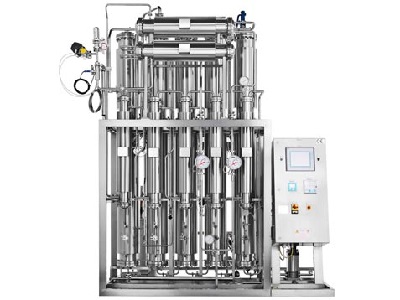When it comes to obtaining high-quality water for industrial, pharmaceutical, or medical applications, both multi-effect water distillers and water purifiers are commonly used systems. While both are designed to produce purified water, their working principles, applications, and efficiency vary significantly. Understanding these differences is crucial for selecting the right system to meet your specific needs.
A multi-effect water distiller (MED) is a system designed to produce high-purity water through a process of repeated distillation. It works by heating water to generate steam and condensing it to remove impurities, such as dissolved solids, salts, and microorganisms. The process is repeated in multiple stages or "effects," with each stage using the heat generated from the previous stage to improve energy efficiency.
Multi-Stage Distillation: The water undergoes several stages of evaporation and condensation to achieve ultra-high purity.
Energy Efficiency: Reuse of heat across stages reduces overall energy consumption.
Applications: MED systems are widely used in pharmaceutical manufacturing, laboratories, and hospitals where Water for Injection (WFI) is required.
A water purifier is a system that removes impurities from water using filtration, chemical treatments, or reverse osmosis (RO). Unlike distillation, water purifiers rely on membrane or filter technology to remove contaminants such as bacteria, viruses, dissolved salts, and organic substances.
Filtration-Based Technology: Processes such as reverse osmosis, ultrafiltration, and activated carbon filtration are common in water purifiers.
Faster Processing: Purification is often quicker compared to the distillation process.
Applications: Water purifiers are used in industries, homes, and businesses for general-purpose drinking water, process water, or wastewater treatment.
| Aspect | Multi-Effect Water Distiller | Water Purifier |
|---|---|---|
| Principle of Operation | Evaporation and condensation (thermal process) | Filtration or chemical separation (membrane-based) |
| Water Purity Level | Produces ultra-pure water, suitable for critical uses | Produces high-purity water but may retain some ions |
| Energy Consumption | Moderate, due to reuse of heat | Lower than distillers, depending on purification method |
| Contaminant Removal | Removes nearly all impurities, including salts and microorganisms | Removes salts, bacteria, and some organic substances but not as thorough as distillation |
| Maintenance | Requires regular cleaning of boiling chambers and condensers | Membrane and filter replacement needed periodically |
| Applications | Pharmaceutical, medical, and laboratory-grade water | Drinking water, industrial water, and process water |
Ultra-High Purity: Produces water that meets stringent standards for pharmaceutical and medical applications.
Thermal Sterilization: The distillation process eliminates bacteria, viruses, and pyrogens, making it ideal for WFI production.
Longevity: Built for long-term use in critical applications with robust materials like stainless steel.
Lower Energy Use: Membrane-based purification systems, like reverse osmosis, consume less energy compared to thermal distillation.
Compact Design: Water purifiers are often smaller and easier to install.
Cost-Effective: For general-purpose water needs, water purifiers are more economical.
Higher Initial Cost: The capital investment is significantly higher than that for water purifiers.
Energy Demand: While energy-efficient for distillation, it still consumes more energy than membrane-based systems.
Processing Time: Distillation takes longer than filtration or RO processes.
Limited Purity: Cannot achieve the ultra-high purity required for certain pharmaceutical or medical uses.
Filter Longevity: Membranes and filters require frequent replacement, adding to operational costs.
Wastewater Generation: Systems like reverse osmosis produce wastewater, which may require additional treatment.
A multi-effect water distiller is the best choice when:
Ultra-pure water is needed for pharmaceutical manufacturing, injection solutions, or laboratory testing.
Compliance with standards such as USP (United States Pharmacopeia) for WFI is mandatory.
Long-term operational reliability and purity assurance are top priorities.
A water purifier is suitable when:
High-quality water is required for general industrial or drinking purposes.
The focus is on cost-efficiency and energy savings.
Wastewater treatment capabilities are available for RO systems.
Both multi-effect water distillers and water purifiers are effective systems for producing clean water, but their efficiency and suitability depend on your specific needs. A multi-effect water distiller is ideal for applications that demand the highest level of water purity, particularly in pharmaceutical and medical fields. On the other hand, water purifiers are cost-effective, energy-efficient solutions for less critical applications.
Understanding the strengths and limitations of each system ensures you can make an informed decision, aligning your water treatment solution with your operational goals and regulatory requirements.


